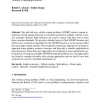Free Online Productivity Tools
i2Speak
i2Symbol
i2OCR
iTex2Img
iWeb2Print
iWeb2Shot
i2Type
iPdf2Split
iPdf2Merge
i2Bopomofo
i2Arabic
i2Style
i2Image
i2PDF
iLatex2Rtf
Sci2ools
HEURISTICS
2010
2010
An adaptive memory algorithm for the split delivery vehicle routing problem
Abstract The split delivery vehicle routing problem (SDVRP) relaxes routing restrictions forcing unique deliveries to customers and allows multiple vehicles to satisfy customer demand. Split deliveries are used to reduce total fleet cost to meet those customer demands. We provide a detailed survey of the SDVRP literature and define a new constructive algorithm for the SDVRP based on a novel concept called the route angle control measure. We extend this constructive approach to an iterative approach using adaptive memory concepts, and then add a variable neighborhood descent process. These three new approaches are compared to exact and heuristic approaches by solving the available SDVRP benchmark problem sets. Our approaches are found to compare favorably with existing approaches and we find 16 new best solutions for a recent 21 problem benchmark set. Keywords Adaptive memory
HEURISTICS 2010 | Human Computer Interaction | Route Angle Control | Split Delivery | Variable Neighborhood |
Related Content
| Added | 03 Mar 2011 |
| Updated | 03 Mar 2011 |
| Type | Journal |
| Year | 2010 |
| Where | HEURISTICS |
| Authors | Rafael E. Aleman, Xinhui Zhang, Raymond R. Hill |
Comments (0)

